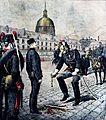Treason facts for kids
Treason is a very serious crime. It happens when a person acts against their own country. For example, someone might help another country fight a war against their homeland. They might also share secrets or fail to protect their country. A person who commits treason is called a traitor.
In the past, treason often involved trying to harm or even kill leaders. Treason against a king was called high treason. Treason against someone less important was called petty treason.
Sometimes, outside of law, people use the word "traitor" to describe someone who betrays a group they belong to. But this can be tricky. The person might not feel they were part of that group in the first place.
Contents
Protecting the Country
One common way people fail their country is by not protecting important things. This includes not protecting people, towns, forests, or old buildings.
Some famous people known as traitors include Judas Iscariot, Benedict Arnold, Philippe Pétain, and Vidkun Quisling.
Treason Laws Around the World
Laws about treason are different in various countries. Here's how some countries define and punish treason.
Australia
In Australia, treason is defined in Section 80.1 of their Criminal Code. A person is not guilty of treason if their help was only for humanitarian reasons. This means they were helping people, not trying to harm the country.
The only punishment for treason in Australia is life in prison.
Canada
Canada has two types of treason defined in Section 46 of its Criminal Code. These are "treason" and "high treason." It is also against the law for any Canadian citizen to commit these acts outside of Canada.
High treason is punished with life in prison. For the other type of treason, the punishment can be life in prison or up to 14 years in prison.
New Zealand
New Zealand's treason laws are in Section 73 of their Crimes Act 1961. The usual punishment for treason is life in prison. However, if someone only planned treason (conspiracy), the punishment is a maximum of 14 years.
Treason was the last crime in New Zealand that could be punished by death. Very few people have ever been charged with treason there.
United States
In the United States, treason is defined in the U.S. Constitution. It is found in Article III, Section 3. However, the U.S. Congress has also created other laws. These laws punish actions that harm national security. Examples include the 1798 Alien and Sedition Acts and the 1917 Espionage Act.
The punishment for treason in the United States can be death. It can also be at least five years in prison. There is also a fine of at least $10,000. Additionally, a person convicted of treason cannot hold any public office in the United States.
Images for kids
-
Cartoon depicting Václav Bělský (1818–1878), Mayor of Prague from 1863 until 1867, in charge of the city during Prussian occupation in July 1866. Some forces wanted to try him for high treason (left: "What some men wished" – "Dr. Bělský for high treason"), but he got a full confidence from the Council of Prague (right: "but what they did not expect" – "address of confidence from the city of Prague").
-
5 January 1895: The treason conviction of Captain Alfred Dreyfus.
See also
 In Spanish: Traición para niños
In Spanish: Traición para niños






